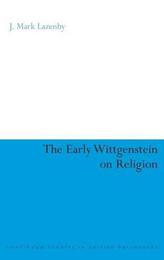
|
The Early Wittgenstein on Religion
Hardback
Main Details
| Title |
The Early Wittgenstein on Religion
|
| Authors and Contributors |
By (author) J. Mark Lazenby
|
| Series | Continuum Studies in British Philosophy |
|---|
| Physical Properties |
| Format:Hardback | | Pages:144 | | Dimensions(mm): Height 234,Width 156 |
|
| Category/Genre | Philosophy of religion |
|---|
| ISBN/Barcode |
9780826486387
|
| Classifications | Dewey:210 |
|---|
| Audience | | Tertiary Education (US: College) | | Undergraduate | | Postgraduate, Research & Scholarly | | Professional & Vocational | |
|---|
|
Publishing Details |
| Publisher |
Bloomsbury Publishing PLC
|
| Imprint |
Continuum International Publishing Group Ltd.
|
| Publication Date |
21 November 2006 |
| Publication Country |
United Kingdom
|
Description
Many have observed how Wittgenstein's later philosophy illuminates the philosophy of religion. Rarely, however, have they paid attention to his early philosophy. Those who have argued that Wittgenstein refuted his early positions in his later work. This book proves otherwise. The proof is found in the answer to an important, but largely ignored, question: what is the relation of Wittgenstein's discussion of logic to his discussion of religion and ethics in the early work? Lazenby's answer is that Wittgenstein, in his discussion of logic, describes the boundaries of factual discourse for the purpose of fixing a common language. And in his discussion of religion and ethics, Wittgenstein suggests that when religious and ethical statements fall outside this common language, we should reconstruct them to make sense within the common language. Such reconstruction ensures that the meaning of religious utterances agrees with how believers actually live and speak. Lazenby's approach is novel because it finds unity in what commentators have considered incommensurable topics in Wittgenstein's early work-logic and religion-while also finding unity between his early and later philosophy. Lazenby ends the book by considering the implications for theology and inter-religious dialogue. If theologians reconstruct the meanings of words that have lost their meaning in the common language of the modern world, these words will regain their force in the lives of believers. And the very possibility of a common language allows logical space for theologians from among the world's religions to find a common language in which to communicate.
Author Biography
J. Mark Lazenby (Ph.D., Boston University) lives with his wife and son, Jodi and Ethan, in Connecticut, USA. Besides being the author of various scholarly papers and short fiction, he is also a published poet.
Reviewsmention- Book News Inc./ August 2007 'The book is elegantly argued and makes an exciting contribution to the development of Wittgenstein's thought by coming at it from a new angle... this book has the potential to move the field in an interesting new direction.' - Robert C. Neville, Boston University * Blurb from reviewer * "His [Lazenby's] primary aim is to challenge the widely prevailing consensus among contemporary philosophers of religion and theologians influenced by Wittgenstein's work that his early philosophy is not to be taken seriously... Lazenby's monograph is well written with a wide range of references" * Notre Dame Philosophical Reviews *
|